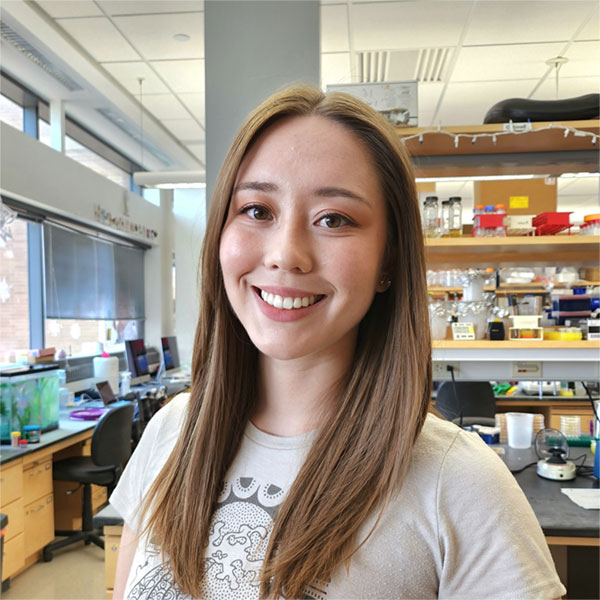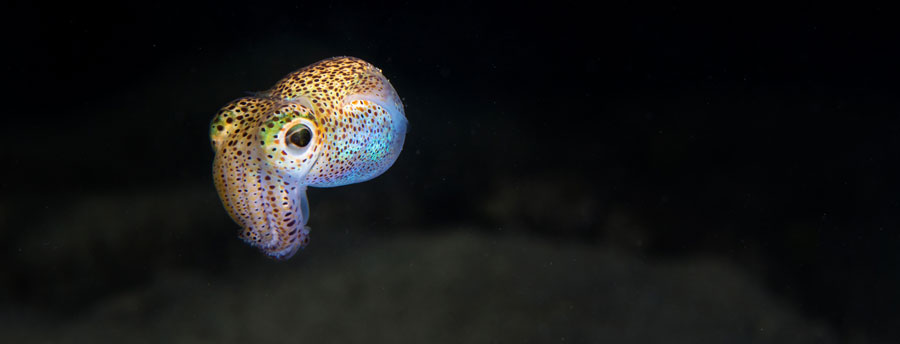Bret Benally Thompson named Physician of the Year
Dr. Bret Benally Thompson was working as a police officer in Texas when he had a “waking vision,” as he describes it, that directed him to pursue his dream of becoming a doctor.

Ruth Isenberg, a first-generation college student who earned her PhD in microbiology from the UW–Madison Microbiology Doctoral Training Program in 2023, was awarded the 2024 Nat L. Sternberg Thesis Prize in August for outstanding doctoral research in the field of bacterial molecular biology. In the 29-year history of the international prize, Isenberg is the first recipient to have completed her dissertation in the UW School of Medicine and Public Health. Her thesis advisor was Mark Mandel, professor of medical microbiology and immunology. Isenberg received her bachelor of science degree in molecular and cellular biology from the University of Puget Sound.
Your dissertation research focused on the associations between beneficial bacteria and their animal hosts. What bacteria-animal system did you study?
The Mandel lab uses the naturally occurring association between the Hawaiian bobtail squid and a bacterium that glows in the dark called Vibrio fischeri to study beneficial host-bacteria interactions. It’s a valuable study system because Vibrio fischeri is the only bacteria that colonizes the specialized light organ of the squid. It’s uncommon to find a naturally occurring host-bacteria association involving only one host and one species of bacteria. The Vibrio-squid system is a natural simplified microbiome, which is useful as a study system because researchers can more easily determine specific bacterial and host factors required for the association, as compared to studying a complex association such as the human gut microbiome.

What were you looking for, specifically?
I was focused on the role of a small molecule, cyclic diguanylate, in establishing associations between beneficial bacteria and their hosts. That role is not well studied, and my dissertation work aimed to help fill that knowledge gap.
What did you discover, and how does it impact the field of microbiology?
My work determined that Vibrio fischeri has a large and complex cyclic diguanylate signaling network — a system that bacteria use to sense and respond to various environmental changes. High levels of cyclic diguanylate prevent host colonization through a mechanism that researchers have yet to fully understand. I originally thought that cyclic diguanylate in Vibrio fischeri would impact squid colonization by influencing biofilm formation (how bacteria stick to each other and to surfaces) and/or motility (how bacteria move around in their environment). Both behaviors are required for Vibrio fischeri to colonize squid, and both behaviors are also regulated by cyclic diguanylate. However, my work shows that while cyclic diguanylate does impact squid colonization, it is not through regulating either biofilms or motility. This means that other mechanisms contribute to Vibrio fischeri’s ability to successfully colonize squid. Uncovering those mechanisms and how cyclic diguanylate influences them would give us new information on how bacteria form beneficial associations with their hosts.
How could your research be translated to advance human health?
Knowing how bacteria form beneficial associations with an animal host could potentially be applied to other bacteria-animal interactions, including those that occur in humans. Also, the human gut microbiome contains bacteria that produce and break down cyclic diguanylate, one of the most common signaling molecules in bacteria. Understanding how bacteria use cyclic diguanylate to contribute to the assembly of a healthy gut microbiome could be useful in the treatment of conditions related to the gut microbiome and development of effective probiotics.
What was most interesting and fulfilling about working on your dissertation in the Mandel laboratory?
The most fulfilling aspect was the mentorship, both received and given. I had a lot to learn when I started in the lab, and during the first few years of my PhD, Mark was patient and supportive while I grew as a scientist. I felt comfortable making mistakes and learning from them under Mark’s guidance, which helped me become independent. I was surrounded by other people in the lab I could go to for support. I also became passionate about teaching and mentoring while I was in the Mandel lab. I started mentoring undergraduate students, and it was my greatest joy to watch them develop into independent scientists. Much of my dissertation would not exist if it were not for these undergraduate students, and I have seen two of them go off to pursue PhDs of their own. During the last couple years of my PhD, Mark basically let me run my own mini lab within his lab with the people I was mentoring, and it instilled in me the desire to continue teaching and mentoring after my PhD. Through the Delta Program in Research, Teaching, and Learning at UW–Madison, I took classes on teaching and mentoring and completed a teaching internship at Madison’s Edgewood College. I am so fortunate to have completed my PhD in a program that allowed me to develop my professional interests.
When did you first know that you wanted to pursue a PhD in medical microbiology?
I’m a first-generation college student, so I knew nothing about the world of research or how getting a PhD worked. It wasn’t until my last semester of my undergraduate degree that I did any sort of research. Once I did, I was hooked and knew that I wanted to pursue a PhD in microbiology. I have my undergraduate advisor and research mentor, Mark O. Martin, PhD, at the University of Puget Sound, to thank for instilling a love for bacteria and microbiology research and supporting me throughout my journey.
Where are you working now, and what are you studying?
I am now a National Institutes of Health (NIH) K12 Institutional Research and Academic Career Development Award (IRACDA) postdoctoral associate at the University of Minnesota, in the lab of Julia Willett, PhD. My work now focuses on how bacteria interact with other bacteria that live in the same niche, and my current research project investigates interactions between the opportunistic pathogen Enterococcus faecalis and the oral cavity pathogen Streptococcus mutans. As a part of my IRACDA fellowship, I am also involved in undergraduate research mentorship and teaching. A major goal of mine is to become a professor and run my own research program while continuing to mentor and teach.
What did you love about Madison, when you were here?
I loved the sense of community in Madison, both within the university and the city as a whole. The research community is collaborative and rigorous without being competitive against each other. The people of Madison are friendly and there are a lot of groups with different interests throughout the city. For example, I am an avid knitter/crocheter and there were several local yarn shops in the area where I could go and find other people with the same interests. I also loved the Terrace at Memorial Union and the collective understanding that summer afternoons are for the Terrace!